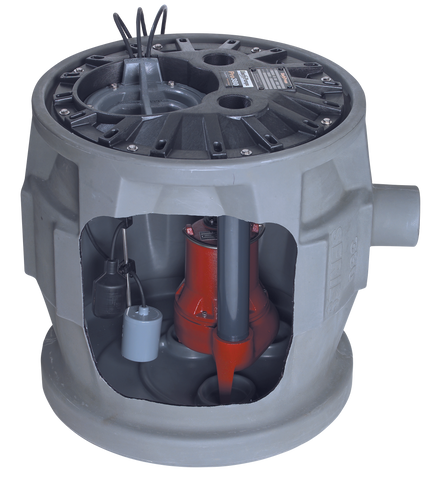There are two main types of grinder pumps: residential grinder pumps and commercial grinder pumps.
Residential Grinder Pumps
Residential grinder pumps are typically used in single-family homes and small businesses. These pumps are compact and designed to handle smaller volumes of wastewater. They are also quieter than commercial grinder pumps. Residential Grinder Pumps are usable with 115 volt receptacles and 20 amp breakers, both of these requirements are standard in residential properties.
Commercial Grinder Pumps
 Commercial grinder pumps are designed to handle larger volumes of wastewater and are used in larger buildings such as apartments, schools, and hospitals. These pumps are typically larger and louder than residential grinder pumps. These pumps are generally 208-230 volt and higher.
Commercial grinder pumps are designed to handle larger volumes of wastewater and are used in larger buildings such as apartments, schools, and hospitals. These pumps are typically larger and louder than residential grinder pumps. These pumps are generally 208-230 volt and higher.
9. Advantages of Grinder Pumps
Grinder pumps offer several advantages over other types of pumps, including:
- They can handle solid waste and other debris that may be present in the wastewater.
- They are designed to pump wastewater uphill or over a long distance.
- They can be installed below ground, making them ideal for areas where space is limited.
- They are available in different sizes and styles, making them suitable for a variety of applications.
When to Use Sewage Pumps
Sewage pumps are typically used in residential and commercial applications where wastewater must be pumped from a lower elevation to a higher elevation or over a long distance. They are also used in areas where the public sewer system is not available, and a septic tank is used for wastewater treatment.
When to Use Grinder Pumps
Grinder pumps are typically used in residential and commercial applications where wastewater must be pumped uphill or over a long distance. They are also used in areas where the public sewer system is not available, and a septic tank is used for wastewater treatment. Grinder pumps are also used in areas where solid waste and other debris may be present in the wastewater.
Conclusion
Sewage pumps and grinder pumps are both used to move wastewater from homes and commercial buildings, but they differ in their function, design, and application. Sewage pumps are designed to handle solids and other debris that may be present in the wastewater, while grinder pumps are designed to grind up solid waste before pumping it into the sewer system or septic tank. When choosing a pump, it's essential to consider the application and specific needs of the system.
FAQs
Q.
What is the difference between a sewage pump and a sump pump?
A. A sewage pump is used to move wastewater from homes and commercial buildings to the public sewer system or a septic tank, while a sump pump is used to remove water from basements and crawl spaces.
Q. Can a sewage pump be used for a septic tank?
A. Yes, a sewage pump can be used to move wastewater from a septic tank to the public sewer system or a drain field.
Q. How often should a sewage pump be serviced?
A. Sewage pumps should be serviced annually to ensure proper operation and prevent clogs.
Q. How do I know if I need a grinder pump?
A. If you need to pump wastewater uphill or over a long distance or if solid waste and other debris are present in the wastewater, a grinder pump may be necessary.
Q. Can I install a sewage pump or grinder pump myself?
A. It's recommended to have a professional install a sewage pump or grinder pump to ensure proper installation and operation.






 Commercial grinder pumps are designed to handle larger volumes of wastewater and are used in larger buildings such as apartments, schools, and hospitals. These pumps are typically larger and louder than residential grinder pumps. These pumps are generally 208-230 volt and higher.
Commercial grinder pumps are designed to handle larger volumes of wastewater and are used in larger buildings such as apartments, schools, and hospitals. These pumps are typically larger and louder than residential grinder pumps. These pumps are generally 208-230 volt and higher. 

Leave a comment